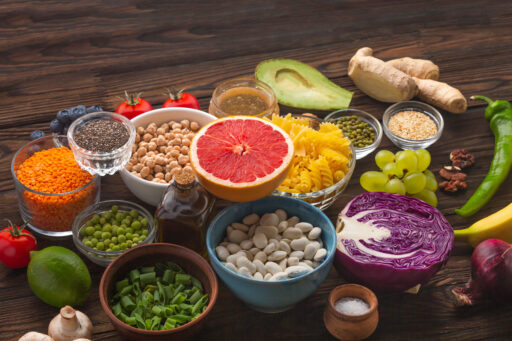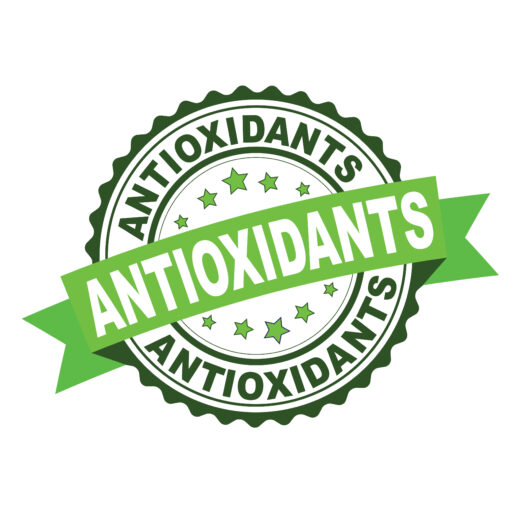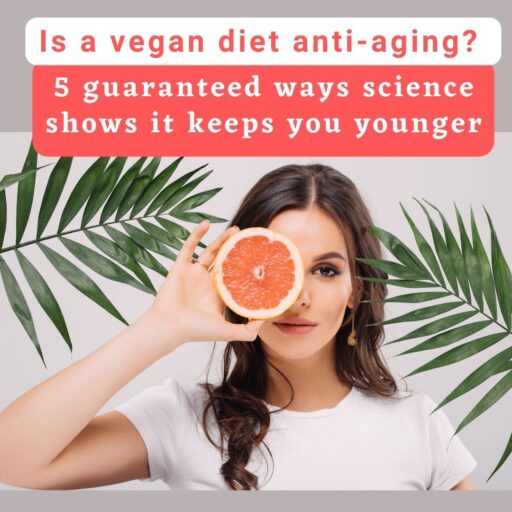According to a 2020 literature review published in the Journal of Clinical Aesthetic Dermatology, a whole-food, plant-based diet helps prevent and even reverse skin aging. According to Kaiser Permanente, a whole-foods plant-based (WFPB) diet is “an eating plan that influences lots of plant foods in their whole, unprocessed form, such as vegetables, fruits, beans, lentils, nuts, seeds, whole grains and small amounts of healthy fats. It does not include animal products… [or] processed foods or sweets.” A WFPB diet is a type of vegan diet that additionally minimizes or eliminates processed oils, sugars and white flour. Let’s find out: exactly how is a vegan diet anti aging?
- 1. Greater intake of antioxidants
- 2. Increased intake of polyunsaturated fatty acids and monounsaturated fatty acids
- 3. Increased telomere length
- 4. Reduced gerontotoxins and inflammation
- 5. Reduced oxidative stress from free radicals
- Is a vegan diet anti aging? Studies show a whole-foods, plant-based one is
1. Greater intake of antioxidants

What are antioxidants? There are hundreds, probably thousands, of different substances that can act as antioxidants. The most familiar ones are carotenoids like vitamin C, vitamin E, and beta-carotene; the minerals selenium and manganese; flavonoids, phenols, polyphenols, phytoestrogens, and many more. These substances fight inflammation and gerontoxins that accelerate skin aging.
Antioxidants, such as vitamin E, vitamin C and vitamin A, neutralize free radicals. Plant foods contain on average 64 times more antioxidants than animal products. Green vegetables are the highest antioxidant vegetables, while berries are the highest antioxidant fruit. Antioxidants give fruits and vegetables their color, so the darker the color, the more the antioxidants. Regularly consuming antioxidant-rich foods prevents oxidized fats from circulating in the blood and damaging small blood vessels.
Chlorophyll acts as another antioxidant. It is the most common plant pigment in the world that makes plants green and has been shown to block DNA damage from carcinogens. This results in reduced skin wrinkles, increased skin firmness, and improvements in skin smoothness.
Polyphenols also have antioxidant properties. They are commonly found in tea, coffee, red wine, vegetables, cereals, chocolate, dry legumes and fruit juices. They have been shown to protect against UV-induced skin damage, oxidative stress, and DNA damage. This leads to improved skin wrinkles and elasticity.
2. Increased intake of polyunsaturated fatty acids and monounsaturated fatty acids

Polyunsaturated fatty acids (PUFAs) and monounsaturated fatty acids (MUFAs) have been shown to reduce skin inflammation. Studies have shown PUFAs to improve UVB-induced damage, reduced skin dryness and atrophy. MUFAs reduce oxidative stress, insulin resistance and related inflammation. For instance, olive oil, which is high in MUFAs, has been shown to help prevent severe skin aging.
3. Increased telomere length

Telomeres are located at the end of each chromosome and keep DNA from unraveling and fraying, like the plastic tips at the end of shoelaces. Every time DNA replicates, telomeres shorten. Once telomeres are completely gone, the cell dies. Telomerase is the enzyme that rebuilds the telomeres.
Lifestyle and diet modifications have been shown to impact telomerase activity, slowing and possibly reversing the aging process. In one study, telomeres appeared to increase in length in those who followed a WFPB for five years. The diet also decreases systemic inflammatory processes, helping to reverse the age of blood vessels.
Poor diets shorten telomere length, contributing to premature aging. Increasing intake of antioxidants and decreasing intake of gerontotoxins results in healthier skin. WFPB diets maximize the antioxidant potential of our cells by providing essential vitamins (A, C, E) and lengthening telomeres.
This dietary pattern has been shown to lengthen telomeres and reverse the aging process of DNA and increase the amount of antioxidants. This translates into healthier, more youthful skin.
4. Reduced gerontotoxins and inflammation

Inflammation accelerates skin aging
Many common skin conditions, such as accelerated skin aging, stem from inflammatory processes. Skin ages from both the intrinsic process and extrinsic factors, like exposure to UV rays, smoking, pollution, sleep disturbance and poor nutrition. This results in fine wrinkles, loss of elasticity, dryness and sallowness. Beyond the cosmetic impact, the aging process negatively impacts lipid and sweat production, immune function, and vitamin D synthesis, among other consequences. This results in impaired wound healing, skin atrophy, and vulnerability to external stimuli.
WFPB diets reduce gerontotoxins, which fights inflammation
Gerontotoxins contribute to systematic inflammation, causing our cells to age. Their buildup can result in skin ulcers, delayed skin healing, and lower skin tensile strength. Diets containing meat and processed foods have been shown to contain the most gerontotoxins, while WFPB diets contain the least. Additionally, cooking methods that rely on high, dry heart (e.g. roasting, grilling) increase the gerontotoxins present in foods. WFPB vegan diets have been shown to reduce the amount of gerontotoxins and carcinogens in the blood.
5. Reduced oxidative stress from free radicals

Free radicals from other internal and external sources are constantly harming our skin by destroying lipids and collagen and causing oxidative stress. Free radicals contribute to skin damage and accelerate aging. Free radicals mediate cell processes like growth, proliferation, differentiation and cell death. But when free radicals accumulate without enough antioxidants to fight them, it causes oxidative stress and damage to cells. Oxidative stress plays a significant role in aging processes, in addition to many diseases.
We accelerate the intrinsic factors that cause skin aging through unhealthful diets that increase oxidative damage to our cells. Oxidative stress accelerates skin aging because it speeds up wrinkle formation, loss of elasticity, dryness, uneven pigmentation and discoloration, susceptibility to irritation and slower wound healing.
A 2022 narrative review published in the Journal of the Academy of Nutrition and Dietetics reported that plant-based foods are rich in antioxidants like vitamin C, vitamin E, beta carotene, polyphenols, and phenolic acids. These compounds can help improve defense against oxidative damage, lower inflammation, and promote structural support of the skin.
Epidemiological studies have also associated higher intakes of select fruits and vegetables with positive skin health. Fruits and vegetables are abundant in vitamins, carotenoids, anthocyanins, and polyphenols, which is recommended for skin health and appearance. In general, yellow, orange, and red fruits like mangos, melons, citrus, tomatoes, and vegetables like red bell peppers and dark-green leafy kale provide good sources of carotenoids.
Anthocyanins and polyphenols are found in fruits with deep red or purple colors like grapes, pomegranate, and passion fruit. Polyphenols are also in nuts, legumes, cocoa, coffee, and tea. Decaffeinated options do not appear to dilute benefits. Strive to consume a wide variety of plant-based foods, as overconsumption of a single food or extract can cause issues.
Is a vegan diet anti aging? Studies show a whole-foods, plant-based one is
The evidence supports a WFPB diet to support younger, healthier looking skin. Through higher intake of 1) antioxidants and 2) poly- and mono-unsaturated fatty acids, whole-foods plant-based vegan diets have been shown to 3) lengthen telomeres, 4) eliminate carcinogens and gerontoxins, and 5) fight oxidative stress from free radical damage, resulting in improved skin smoothness, hydration, firmness and elasticity – keeping you looking and feeling your best!


